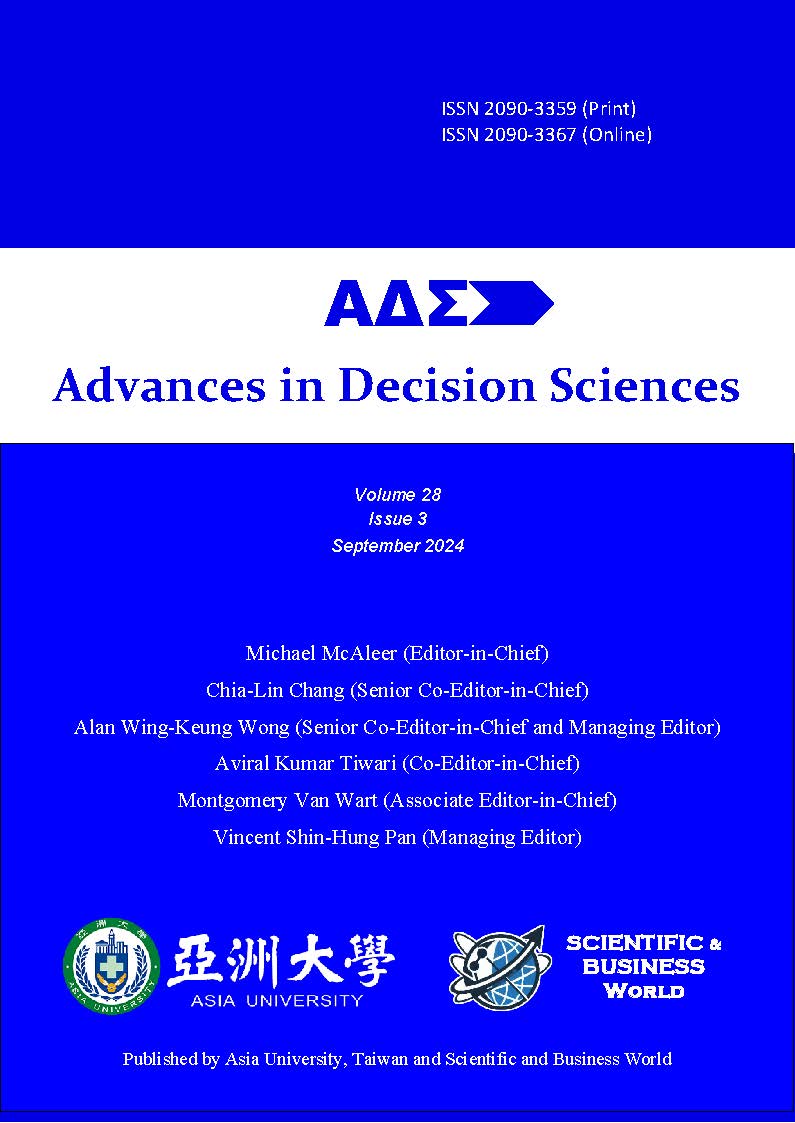Corporate Social Responsibility and its Influence on Trade Credit: An Analysis of China's A-Share Corporate Sector
DOI:
https://doi.org/10.47654/v28y2024i3p25-51Keywords:
Corporate Social Responsibility, Trade Credit, Asset Tangibility, Firm Size, Firm EfficiencyAbstract
Objective: This study investigates the relationship between Corporate Social Responsibility (CSR) and trade credit financing, focusing on Chinese A-Share listed firms from 2010 to 2022.
Methodology: This study employs robust econometric techniques, including Panel Estimated Generalized Least Squares (EGLS) and System Generalized Method of Moments (GMM), to provide empirical evidence of an inverse relationship between CSR activities and firms' reliance on trade credit.
Findings: The findings reveal that firms actively engaging in high levels of CSR tend to rely less on trade credit. This reduced dependency is mainly due to the positive impact that socially responsible practices have on fostering trust and building stronger relationships with suppliers. By consistently demonstrating their commitment to ethical, environmental, and social standards, these firms create a reputation for reliability and integrity, strengthening their bonds with suppliers and opening up access to more diverse and favorable financing options beyond trade credit. This shift occurs because the trust built through CSR initiatives makes suppliers more willing to offer flexible payment terms or alternative financial arrangements. At the same time, banks and investors may view these firms as lower-risk and more deserving of credit support.
Implications: The study also offers practical insights for corporate managers and policymakers, emphasizing the importance of integrating CSR into strategic financial planning to mitigate reliance on short-term financing mechanisms.
Novelty: This study offers novel insights by exploring the complex relationship between CSR and trade credit, specifically in the context of Chinese A-share listed firms.
References
Aitken, A. C. (1936). On Least Squares and Linear Combination of Observations. Proceedings of the Royal Society of Edinburgh, 42-48.
Arellano, M., & Bond, S. (1991). Some tests of specification for panel data: Monte Carlo evidence and an application to employment equations. The review of economic studies, 58(2), 277-297.
Arkhangelsky, D., Imbens, G. W., Lei, L., & Luo, X. (2024). Design‐robust two‐way‐fixed‐effects regression for panel data. Quantitative Economics, 15(4), 999-1034.
Attig, N. (2024). Relaxed financial constraints and corporate social responsibility. Journal of Business Ethics, 189(1), 111-131. Retrieved from https://doi.org/10.1007/s10551-023-05353-9
Bag, S., & Omrane, A. (2022). Corporate Social Responsibility and Its Overall Effects on Financial Performance: Empirical Evidence from Indian Companies. Journal of African Business, 23(1), 264-280. Retrieved from https://doi.org/10.1080/15228916.2020.1826884
Baltagi, B. H., (2005). Econometric analysis of panel data (Vol. 5, pp. 135-145). Chichester: Wiley.
Barney, J. (1991). Firm Resources and Sustained Competitive Advantage. Journal of Management, 17(1), 99-120. Retrieved from http://dx.doi.org/10.1177/014920639101700108
Bond, S. R., Hoeffler, A., & Temple, J. R. (2001). GMM Estimation of Empirical Growth Models. Available at SSRN: https://ssrn.com/abstract=290522, 37.
Boubaker, S., Liu, Z., & Zhan, Y. (2022). Customer relationships, corporate social responsibility, and stock price reaction: Lessons from China during health crisis times. Finance Research Letters, 47. Retrieved from https://doi.org/10.1016/j.frl.2022.102699
Chai, S., Zhang, K., Wei, W., Ma, W., & Abedin, M. Z. (2022). The impact of green credit policy on enterprises' financing behavior: Evidence from Chinese heavily-polluting listed companies. Journal of Cleaner Production, 363. Retrieved from https://doi.org/10.1016/j.jclepro.2022.132458
Chen, X., Wang, C., & Li, S. (2023). The impact of supply chain finance on corporate social responsibility and creating shared value: a case from the emerging economy. Supply Chain Management: An International Journal, 28(2), 324-346. Retrieved from https://doi.org/10.1108/SCM-10-2021-0478
Cheng, Y., Hui, Y., McAleer, M., & Wong, W. K. (2021). Spurious relationships for nearly non-stationary series. Journal of Risk and Financial Management, 14(8), 366.
Cheng, Y., Hui, Y., Liu, S., & Wong, W. K. (2022). Could significant regression be treated as insignificant: An anomaly in statistics?. Communications in Statistics: Case Studies, Data Analysis and Applications, 8(1), 133-151
Coelho, R., Jayantilal, S., & Ferreira, J. J. (2023). The impact of social responsibility on corporate financial performance: A systematic literature review. Corporate Social Responsibility and Environmental Management, 30(4), 1535-1560. Retrieved from https://doi.org/10.1002/csr.2446
Cui, X., Wang, P., Sensoy, A., Nguyen, D. K., & Pan, Y. (2022). Green Credit Policy and Corporate Productivity: Evidence from a Quasi-natural Experiment in China. Technological Forecasting and Social Change, 177. Retrieved from https://doi.org/10.1016/j.techfore.2022.121516
Darendeli, A., Fiechter, P., Hitz, J. M., & Lehmann, N. (2022). The role of corporate social responsibility (CSR) information in supply-chain contracting: Evidence from the expansion of CSR rating coverage. Journal of Accounting and Economics, 74(2-3). Retrieved from https://doi.org/10.1016/j.jacceco.2022.101525
Farooq, U., Ahmed, J., & Shahbaz, M. (2022). How various energy sources affect industrial investment? Empirical evidence from Asian economies. Energy, 248. Retrieved from https://doi.org/10.1016/j.energy.2022.123536
Farooq, U., Ahmed, J., Tabash, M. I., Anagreh, S., & Subhani, B. H. (2021). Nexus between government green environmental concerns and corporate real investment: Empirical evidence from selected Asian economies. Journal of Cleaner Production, 314. Retrieved from https://doi.org/10.1016/j.jclepro.2021.128089
Freeman, R. E. (1984). Strategic management: A stakeholder approach ((Pitman Series ed.) ed.). Cambridge: MA: Cambridge University Press.
Gregory, R. P. (2024). The influence of firm size on ESG score controlling for ratings agency and industrial sector. Journal of Sustainable Finance & Investment, 14(1), 86-99. Retrieved from https://doi.org/10.1080/20430795.2022.2069079
Hasan, M. M., & Alam, N. (2022). Asset redeployability and trade credit. International Review of Financial Analysis, 80. Retrieved from https://doi.org/10.1016/j.irfa.2022.102024
Huang, H., Shang, R., Wang, L., & Gong, Y. (2022). Corporate social responsibility and firm value: evidence from Chinese targeted poverty alleviation. Management Decision, 60(12), 3255-3274. Retrieved from https://doi.org/10.1108/MD-07-2021-0993
Huang, N., He, R., Luo, L., & Shen, H. (2024). Carbon emission trading scheme and firm debt financing. Journal of Contemporary Accounting & Economics, 20(1). Retrieved from https://doi.org/10.1016/j.jcae.2023.100384
Jensen, M. C., & Meckling, W. H. (1976). Theory of the firm: Managerial behavior, agency costs and ownership structure. Journal of Financial Economics, 3(4), 305–360.
Lawrenz, J., & Oberndorfer, J. (2018). Firm size effects in trade credit supply and demand. Journal of Banking & Finance, 93, 1-20. Retrieved from https://doi.org/10.1016/j.jbankfin.2018.05.014
Le, T. T. (2023). Corporate social responsibility and SMEs' performance: mediating role of corporate image, corporate reputation and customer loyalty. International Journal of Emerging Markets, 18(10), 4565-4590. Retrieved from https://doi.org/10.1108/IJOEM-07-2021-1164
Legesse, T. S., & Guo, H. (2020). Does firm efficiency matter for debt financing decisions? Evidence from the biggest manufacturing countries. Journal of Applied Economics, 23(1), 106-128. Retrieved from https://doi.org/10.1080/15140326.2020.1711591
Li, W., Cui, G., & Zheng, M. (2022). Does green credit policy affect corporate debt financing? Evidence from China. Environmental Science and Pollution Research, 29(4), 5162-5171. Retrieved from https://doi.org/10.1007/s11356-021-16051-2
Liu, G., & Wang, S. (2023). Digital transformation and trade credit provision: Evidence from China. Research in International Business and Finance, 64. Retrieved from https://doi.org/10.1016/j.ribaf.2022.101805
Lv, C., Fan, J., & Lee, C. C. (2023). Can green credit policies improve corporate green production efficiency? Journal of Cleaner Production, 397. Retrieved from https://doi.org/10.1016/j.jclepro.2023.136573
Peng, B., Yan, W., Elahi, E., & Wan, A. (2022). Does the green credit policy affect the scale of corporate debt financing? Evidence from listed companies in heavy pollution industries in China. Environmental Science and Pollution Research, 29(1), 755-767. Retrieved from https://doi.org/10.1007/s11356-021-15587-7
Rahmadhania, S., Faisal, F., Joseph, C., & Januarti, I. (2024). Corporate social responsibility and corporate investments: does research and development intensity matter? Cogent Business & Management, 11(1). Retrieved from https://doi.org/10.1080/23311975.2024.2375618
Rahman, M. H., Tanchangya, T., Rahman, J., Aktar, M. A., & Majumder, S. C. (2024). Corporate social responsibility and green financing behavior in Bangladesh: Towards sustainable tourism. Innovation and Green Development, 3(3). Retrieved from https://doi.org/10.1016/j.igd.2024.100133
Rousseau, J. J. (1762). The social contract; or, Principles of Political Right. France (edited in Amsterdam): CreateSpace Independent Publishing Platform. Retrieved from https://www.files.ethz.ch/isn/125486/5017_Rousseau_The_Social_Contract.pdf
Spence, M. (1973). Job market signaling. Quarterly Journal of Economics, 87(3), 355-374. Retrieved from https://doi.org/10.2307/1882010
Su, C. W., Li, W., Umar, M., & Lobont, O. R. (2022). Can green credit reduce the emissions of pollutants? Economic Analysis and Policy, 74, 205-219. Retrieved from https://doi.org/10.1016/j.eap.2022.01.016
Subhani, B. H., Farooq, U., Bhatti, M. I., & Khan, M. A. (2021). Economic Policy Uncertainty, National Culture, and Corporate Debt Financing. Sustainability, 13(20). Retrieved from https://doi.org/10.3390/su132011179
Ting, I. W., Asif, J., Kweh, Q. L., & Phuong, T. T. (2024). Mediating effect of firm efficiency on the controlling shareholdings–firm performance nexus: evidence from public listed firms in Malaysia. Financial Innovation, 10(1), 47.
Tingbani, I., Afrifa, G. A., Tauringana, V., & Ntim, C. (2024). Trade credit and corporate growth. International Journal of Finance & Economics, 29(1), 206-228. Retrieved from https://doi.org/10.1002/ijfe.2683
Tong, Y., & Moro, A. (2020). Trade credit in China: Exploring the link between short term debt and payables. Pacific-Basin Finance Journal, 59. Retrieved from https://doi.org/10.1016/j.pacfin.2019.101240
Villamor, G. B., & Wallace, L. (2024). Corporate social responsibility: Current state and future opportunities in the forest sector. Corporate Social Responsibility and Environmental Management., 31(4), 3194-3209. Retrieved from https://doi.org/10.1002/csr.2743
Wenqi, D., Khurshid, A., Rauf, A., & Calin, A. C. (2022). Government subsidies’ influence on corporate social responsibility of private firms in a competitive environment. Journal of Innovation & Knowledge, 7(2). Retrieved from https://doi.org/10.1016/j.jik.2022.100189
Wong, W. K., Cheng, Y., & Yue, M. (2024). Could regression of stationary series be spurious?. Asia-Pacific Journal of Operational Research, forthcoming.
Wong, W. K., & Yue, M. (2024). Could regressing a stationary series on a non-stationary series obtain meaningful outcomes?. Annals of Financial Economics, forthcoming
Xie, X., Shi, X., Gu, J., & Xu, X. (2023). Examining the Contagion Effect of Credit Risk in a Supply Chain under Trade Credit and Bank Loan Offering. Omega, 115. Retrieved from https://doi.org/10.1016/j.omega.2022.102751
Yum, M. (2021). Model selection for panel data models with fixed effects: a simulation study. Applied Economics Letters, 29(19), 1776–1783. https://doi.org/10.1080/13504851.2021.1962505
Zadeh, M. H., Naaman, K., & Sahyoun, N. (2023). Corporate social responsibility transparency and trade credit financing. International Journal of Accounting & Information Management, 31(2), 247-269. Retrieved from https://doi.org/10.1108/IJAIM-05-2022-0099
Zellner, A. (1962). An efficient method of estimating seemingly unrelated regressions and tests for aggregation bias. ournal of the American statistical Association, 57(298), 348-368. Retrieved from https://www.tandfonline.com/doi/abs/10.1080/01621459.1962.10480664
Zhou, Z., & Li, Z. (2023). Corporate digital transformation and trade credit financing. Journal of Business Research, 160. Retrieved from https://doi.org/10.1016/j.jbusres.2023.113793

Published
Issue
Section
License
Copyright (c) 2024 Advances in Decision Sciences

This work is licensed under a Creative Commons Attribution-NonCommercial 4.0 International License.



 Scientific and Business World
Scientific and Business World